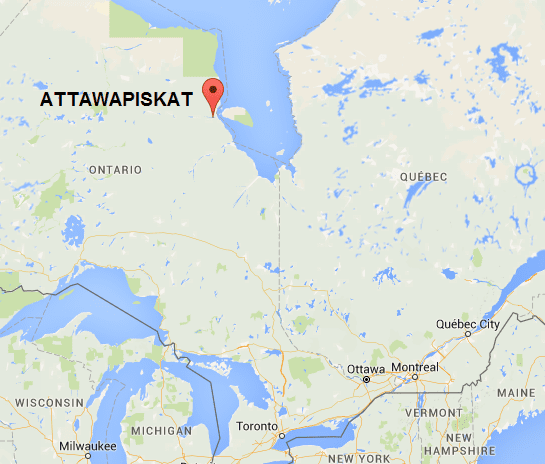First Nations activists of the Idle No More movement, together with the solidarity of Black Lives Matter, entered their second day of an occupation of Canada’s Indigenous and Northern Affairs office in Toronto on Thursday to protest government inaction in the face of a suicide emergency in the northern Attawapiskat First Nation.
“This is our time to fight against the continuing genocide of our people,” Carrie Lester of the Mohawk Six Nations Grand River Territory told teleSUR by phone on Thursday from inside the INAC occupation. “Suicides are also part of the genocide when conditions are so deplorable that 10-year-old children make suicide pacts because they have no hope for their future.”
After launching the protest Wednesday morning, Idle No More activists have vowed to continue camping out at the INAC office until the call for Prime Minister Justin Trudeau to personally visit Attawapiskat is answered. Lester said that about 20 people were still holding space at the occupation after some had to leave early Thursday morning.
“We are still awaiting confirmation that Prime Minister Trudeau has committed to going up to Attawapiskat this week,” said Lester. She added that the protest echoes key demands voiced by Attawapiskat, namely that Trudeau pay a visit to the tragedy-stricken community and that the federal government commit to essential projects including a youth center and other much-needed infrastructure that is largely taken for granted in Canada.
The remote northern First Nation community of Attawapiskat declared a state of emergency after 11 people attempted suicide in one night last Saturday. The attempts are just the latest in a crisis of 101 people who have tried to take their own lives in the last seven months in the community of 2,000 people.
Attawapiskat is also just one example of a broader national tragedy of exceptionally high suicide rate in Indigenous communities, both on and off reserve, across Canada. Last month, for example, a series of suicides in the northern Pimicikamak Cree Nation in the province of Manitoba also prompted the First Nation to declare a state of emergency.
“This situation is not isolated to Attawapiskat,” Lester explained. “These suicide pacts have been in use for decades, this is just one of the most recent ones where 11 made a pact and they were unsuccessful in their attempt at suicide.”
And the foundations of the crisis, deeply rooted in Canada’s colonial relationship and racist policy towards First Nations, date back generations.

“Reserves were put in place for our people to put us out of sight and out of mind, knowing that in a very short time they were assuming that out people would be gone and that the land would no longer be held by Indian title and would be free for the Crown to take,” said Lester, adding that beginning at least 100 years ago, Canada believed that the only solution to the so-called “Indian problem” was complete assimilation.
The historical and ongoing systemic neglect of Indigenous communities, which also saw First Nations reserves, a small fraction of traditional lands, further eroded by settlers over the years, is evident in Attawapiskat.
The community has voiced its need for basic infrastructure like playgrounds, libraries, and roads to support youth and offer a more promising future to younger generations. Lester added that roads and essential services must be prioritized “not because extractive companies want them to be able to continue their extraction, but because the community needs them for their livelihood.”
Over 24-hours into the occupation, protesters still are not able to use bathrooms in the building after access was cut off on Wednesday. Lester explained that the use of buckets instead of bathroom facilities is seen as a “minor sacrifice” in the context of such important demands.
Occupiers also have no outdoor access, as they will not be allowed back in if they leave. Solidarity activists have also gathered outside the INAC building.
Lester said that unless Trudeau immediately confirms as visit to Attawapiskat, it is possible that other INAC locations in other cities will be occupied to increase pressure on the federal government to act.
A march is planned on Parliament Hill in Ottawa on Friday beginning at 9:00 a.m. local time in solidarity with Attawapiskat and with the INAC occupation to further pressure federal authorities to take urgent and culturally-appropriate action to address the crisis.